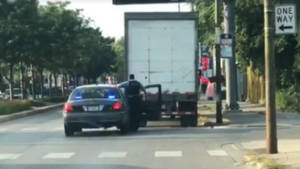 ...Leave a steak next to a den of hungry lions, won't they eat it?
...Leave a steak next to a den of hungry lions, won't they eat it?
Residents from the city of Chicago, went up in a fury after railroad cops and chicago police officers used a “bait truck” in a South Side neighborhood in an attempt to “catch offenders” due to an increase in break-ins at railyards. But community members are calling this a form of entrapment; stating that officers are unjustly targeting a certain demographic in order to increase incarceration rates.
Their mindset is this:
Leave a steak next to a den of hungry lions, won’t they eat it? The outcry of the public was simple.
This bait truck was left in an urban, impoverished, and underserved community where black boys and girls are literally STARVING to survive. It wasn’t left in the suburb of a predominantly white community where resources are plentiful, and overflowing--which had further prompted people to believe this narrative of entrapment.
Of course, social media played a huge part in the discussion forum surrounding this event, and layers were peeled off as opinions turned into hate, and passion turned into anger.
Some argued that entrapment involves coercion, as it is defined as the “action of tricking someone into committing a crime in order to secure a prosecution.” The Chicago Police department is standing behind their tactics, even though releasing a public apology. It is true: No one was forced to steal. However, the circumstances of those who live in the low-income community, speak to a different level by suggesting that placing this bait truck there was a “trick” in itself.
So, why the outrage?
Black and brown boys from the hungriest parts of Chicago wake up on survival mode every day because they lack resources that should be given to them, naturally. If you don’t know what it’s like to be a black and brown boy from these types of communities; to be starved in more ways than one: financially, mentally, emotionally and educationally, then it is hard to speak on whether or not you agree with this concept of entrapment.
Most people argued that despite a lack of resources, morals should override desperation--that stealing is still wrong, and unethical. There is a saying, adapted from a Cherokee prayer, Moccasins, that reads:
Oh Great Spirit, grant that I may nevercriticize my brother or my sister until I have walked the trail of life in their moccasins.
Empathy, understanding, and an aggressively nonjudgmental world outlook are essential attributes to leading social change. The metaphor of walking in the moccasins of another person before offering criticism is a remarkably useful leadership tool, as well as a moral imperative. As Robert F. Kennedy noted, “The task of leadership, the first task of concerned people, is not to condemn or castigate or deplore; it is to search out the reason for disillusionment and alienation, the rationale of protest and dissent – perhaps, indeed, to learn from it.”
The bigger picture surrounding the bait truck is the “burn” that comes with it. Taunting around merchandise that our youth can use, and/or profit from all for the sake of personal and hidden agendas is terrorizing. It’s one thing to lure a specific criminal, but targeting an entire area--one that has a noticeable record of poverty and violence, is unjust, and scandalous.
Moreso, the Chicago violence has garnered nationwide, if not, global attention. Shouldn’t the Chicago police department use this ill-placed energy to solving more of those crimes and executing preventative measures to ensuring the community’s safety?
I was able to see a lot of discussion pan out over a week-long debate. What happened in Chicago in regards to this bait truck shed light on a much heavier and deeper issue: the criminalization of black men and youth. Activists from Chicago such as Father Pfleger and Charles McKenzie have not been very vocal about this matter and are pushing forth efforts to shine this light more positively and impact Chicago on a greater level.
Vic Mensa, a rapper from Chicago is said to give away 10,000 pairs of shoes at the site where the bait truck was planted.
After witnessing the debate, I was left with these thoughts:
The comments from men whose pages are adorned with the American Flag, whose privilege and patriotic backgrounds blind their view on real America, real issues and real topics, were disheartening to witness. I am reminded that the trust between the community and the police could not be more tarnished, and divided. I am reminded that whether this was technically entrapment, or not, it was a scandalous act. And then I am reminded, This is America, “their” America.

Abril Green (Edwards) is an author, spoken word artist & motivational speaker; founder of #BumpyButNotBlocked Ministries & Spoken WorDship where she spits "Poetry with A Purpose". Currently a Literacy Interventionist at Chicago Public Schools, Abril believes "the greatest relationship outside of Man and His Higher Power, is between a Pen and HER Paper."








